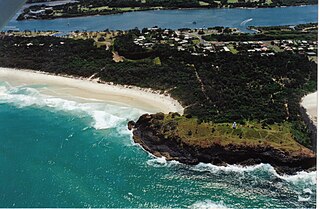See also
- Fingal Bay, New South Wales, near Port Stephens in Australia
- Fingal's Cave, sea-cave on Staffa in the Inner Hebrides of Scotland
- Finghall, village in North Yorkshire, England
- Irish place names in other countries
Fingal is a county in Ireland, formerly the northern part of the historical county of Dublin. Fingal may also refer to:
Balmoral Castle is a residence of King Charles III in Aberdeenshire, Scotland.
Canton may refer to:
Waterloo most commonly refers to:
Windsor may refer to:
Durham most commonly refers to:
Newington may refer to several places:
Saint Margaret, St. Margarets, or St. Margaret's may refer to:
Eden may refer to:
Granville may refer to:
Campbell may refer to:
Highland is a broad term for areas of higher elevation, such as a mountain range or mountainous plateau.
Clarence may refer to:
Marengo may refer to:

Fingal Head is a village on the Tasman Sea coast in the far northeast of New South Wales, Australia, about 5 km south of the New South Wales and Queensland border. The village is often just called Fingal. The headland and the small off-shore Island were first sighted by James Cook about 17:00 on 16 May 1770. At the time of the 2016 census, Fingal Head had a population of 592 people.
An inch is a unit of measurement.
Londonderry is a city in Northern Ireland.
Dunmore from the Irish: Dún Mór or Scottish Gaelic: Dùn Mòr, meaning "great fort", may refer to:
Hamilton may refer to:
The following index is provided as an overview of and topical guide to Wikipedia's articles on recreational dive sites. The level of coverage may vary:

Recreational dive sites are specific places that recreational scuba divers go to enjoy the underwater environment or for training purposes. They include technical diving sites beyond the range generally accepted for recreational diving. In this context all diving done for recreational purposes is included. Professional diving tends to be done where the job is, and with the exception of diver training and leading groups of recreational divers, does not generally occur at specific sites chosen for their easy access, pleasant conditions or interesting features.